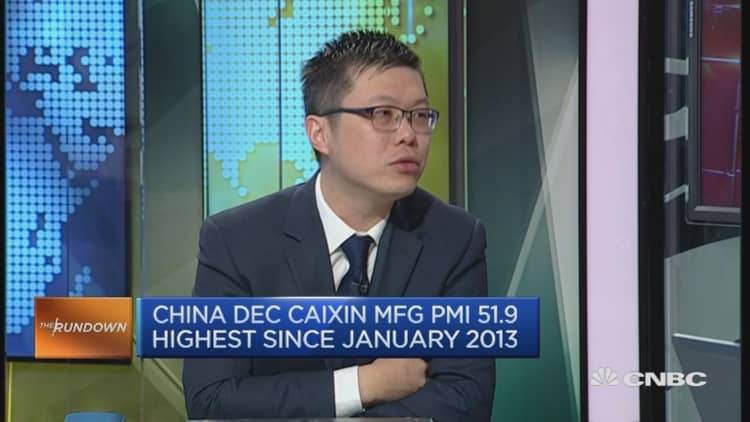To a group of leading Chinese economists, President-elect Donald Trump's tough talk on China is likely just that — talk.
Trump has tapped a group of outspoken China critics for key trade roles, including the author of a book called "Death by China" and a lawyer who's fought against China dumping steel into the U.S. market. To many U.S.-based analysts and lawyers, the announcements indicate that Trump is serious about getting tough on China.
But the tone among Chinese thinkers was more placid on Thursday at an event on China's economy that was hosted by the National Committee on U.S.-China Relations.
"I think there's room for common ground to come to mutual understanding," said Justin Lin, director at the Center for New Structural Economics at Peking University, and the former chief economist at the World Bank.
"In the campaign, some people always use rhetoric to win the election, but I am confident that when it comes to reality, what's good for China is good for the U.S.," Lin said.

Trump has called for the U.S. Trade Representative to bring trade cases against China and has said he wants to label the No. 2 global economy a currency manipulator.
The president-elect is viewed by many Chinese as first and foremost a negotiator — someone who uses strong words up front but then follows with more mellow action. Chinese business leaders speaking the weekend after the election were confident that as a businessman, Trump would enact policies that are ultimately favorable for both China and the U.S. That sentiment remained the same at Thursday's gathering of Chinese academics and finance professionals.
"The U.S.-China relationship is vital," said Huang Haizhou, managing director and management committee member at the China International Capital Corp. (CICC). They are "the number one and number two economies of the world."
China was the United States' largest supplier of imported goods in 2015, and the third-largest goods export market for the U.S., according to an estimate from the United States Trade Representative website.
Many critics say companies in China have unfair advantages thanks to government support from Beijing. Previous U.S. presidential candidates have talked about increasing pressure on China, but then toned down their stance after taking office. For example, President Barack Obama said during his 2008 campaign that China's huge trade surplus with the United States is "directly related to its manipulation of its currency's value." But in his eight years as president, the U.S. never put the manipulator label on China.
"The narrative about the tensions has a life [of] its own," one version in China and another outside, said Zha Daojiong, professor in the school of international studies at Peking University.
When "you really come back to what's going on on the ground … there's not really much that's causing concern," he said. He added that professional groups in both China and the United States should do more to "to inform policymakers to help temper some of these tendencies to fight the situation."
'Uncertainty' for others
Lu Feng, director of the China Macroeconomic Research Center at Peking University, was more cautious in his outlook on U.S.-China relations under the Trump administration.
"I think it is an uncertainty since we don't know what his policy will look like. The campaign language in terms of currency, in terms of a trade war, could be troublesome," Feng said, adding that "a trade war is something I think we should try very hard to avoid."
Maintaining a stable growth environment is a particular priority for Chinese authorities this year, as the Communist Party congress is due to meet in the fall of 2017. Chinese President Xi Jinping is expected to consolidate his power at the meeting, and doesn't want to see US. policy causing growth disruptions for his country.
For China, "I think the biggest external risk is a trade war," Nicholas Lardy, a senior fellow at the Peterson Institute for International Economics in Washington, said during one panel discussion Thursday.
"If we're headed in that direction, I think we can downgrade China's growth outlook," he said.
Currency markets have already seen more action as traders try to anticipate the economic impact from Trump's policies. The U.S. dollar strengthened to a 14-year high this week, even though Beijing has stepped up efforts to support the yuan and limit capital outflows from China.


